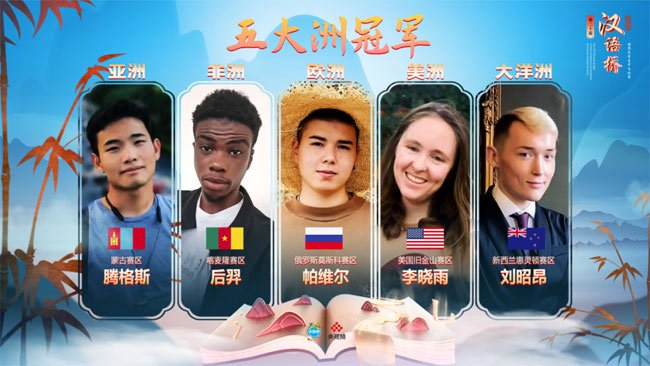The continental championship competition of the 20th "Chinese Bridge" Chinese Proficiency Competition for Foreign College Students was held online recently. The global top 15 gathered to launch an exciting competition.
In this stage, the competitors' Chinese level and understanding of Chinese culture were investigated through objective multiple choice questions and subjective expression questions. Through the objective multiple choice question session, a total of 10 competitors whose scores ranked the top two from five continents entered the subjective expression question session. In the subjective expression questions session, the highest scorer from each continent is the continent champion and advances to the global finals.
Objective multiple choice questions revolve around Chinese characters, ancient poems, 24 solar terms, myths and legends, ecological protection, geographical knowledge, etc.
During the competition, a question entitled "Which two traditional Chinese artistic elements were used in the logo design of the 15th Meeting of the Conference of the Parties to the Convention on Biological Diversity?" triggered a heated discussion.
Kendall Kracke, from the USA, said that she was fond of Chinese culture and showed her embroidery works through the camera. Munis Narzulloeva of Tajikistan showed her "Four Pictures of Wintersweet, Orchid, Bamboo and Chrysanthemum". Annie Rasolofoharitiana from Madagascar showed local characteristic wood carvings. Grace Mukisa Kaziro showed Uganda's bark paintings... The contestants explained their understanding of different cultures in their own way.
The judges also interacted enthusiastically with the contestants and were full of interesting things. Professor Zhao Yang, professor and dean of the School of Chinese Language Education at Peking University, introduced the two-part allegorical saying "Jiang Ziya is fishing---only those who is willing to be hooked" from the allusion of Jiang Ziya fishing in the title, explaining this two-part allegorical saying to the competitors. Later, Ju Ping, a well-known host of the China Media Group, gave the competitors a "difficult" two-part allegorical saying baffled many competitors. However, in the face of common two-part allegorical sayings such as "To hit the egg to the rock", "Reading while riding a donkey", "The bride is getting on the bridal sedan chair." and "The dog catches the mouse", the contestants actively participated in and reacted.
The competition was very fierce and the score was frequently nearly the same between competitors. After the objective questions session was completed, Tengis Munkhbaatar and Ngoc Anh Nguyen in Asia, Grace Mukisa Kaziro and Mounchili Mohamed Dair in Africa, Pavel Arkhipov and Dmitrii Shcheglov in Europe, Kendall Kracke and Jonathan Marin-Clermont in America, John Beijen and Jaffar Khoa Bui-Al-Shammery in Oceania won in this part.
In the subjective expression session, the contestants introduced their favorite Chinese literary works in Chinese, ranging from ancient classics to modern works, from essays to science fiction, with various types, fully demonstrating their love and familiarity with Chinese language and literature.
Russian competitor Pavel Arkhipov told the story of "From Baicao Garden to Sanwei Bookstore" with his own experience. When he was a child, he didn't like reading and often stayed in his "Baicao Garden". A short experience of studying abroad in China made him realize the pleasure of learning and experienced the transformation from "Baicao Garden" to "Sanwei Bookstore". From then on, he made up his mind to study and live in China.
"She throws a quince to me, I give her a green jade. Not in return, you see, But to show acquaintance made." Grace Mukisa Kaziro from Uganda said, The Book of Songs is often regarded as the first of the five Chinese classics, the source of Chinese literature, and the scene for the world's friends chanted "Papaya", wishing friendship forever and everlasting!
Mongolian contestant Tengis Munkhbaatar recommended Dr. Huang Guoping's graduation article entitled Thanks from the Chinese Academy of Sciences. He said that he was particularly touched after reading this article. I hope everyone can gain strength through reading it, face the difficulties in life and study, do not fear hardships, study hard, be determined, concentrate on research, and will surely make progress and success!
After two competitions, Tengis Munkhbaatar from Mongolia, Mounchili Mohamed Dair from Cameroon, Pavel Arkhipov from Moscow, Russia, Kendall Kracke from San Francisco, USA, and John Beijen from Wellington, New Zealand, won the titles of continental champions respectively.
College students from all over the world gathered here through the "Chinese Bridge" competition, not only showing their excellent Chinese level, but also showing their youthful style. Congratulations to these five competitors and look forward to their better performance in the final competition for the global championship. I also hope that all the contestants, with their love for Chinese and Chinese culture, will continue to firmly walk along the road of learning Chinese and gain knowledge and friendship in the big family of "Chinese Bridge". (Information Sources:Center for Language Education and Cooperation)



